Introduction
Ecommerce automation has become a cornerstone of success for businesses of all sizes.
From marketing automation for Ecommerce to sophisticated Ecommerce fulfillment automation, these technologies are revolutionizing how online stores operate.
According to a report by Grand View Research, the global Ecommerce automation market size is expected to reach $19.8 billion by 2028, growing at a CAGR of 8.9% from 2021 to 2028.
One of the most significant areas of growth is in Ecommerce email marketing automation, with Statista reporting that 49% of companies are currently using marketing automation, and more than half of B2B companies plan to adopt the technology.
Ecommerce automation software is becoming increasingly sophisticated, integrating AI and machine learning to provide personalized customer experiences and streamline operations.
Furthermore, Ecommerce chatbots are transforming customer service, with Juniper Research predicting that chatbots will save businesses $8 billion annually by 2022. These AI-powered assistants are enhancing customer engagement and providing 24/7 support.
As we delve into the different types of Ecommerce automation, from Ecommerce marketing automation for Ecommerce to Ecommerce fulfillment automation, we'll explore how to shape the future of online retail and provide businesses with powerful tools to drive growth and efficiency.
Benefits of Choosing the Right Type of Ecommerce Automation
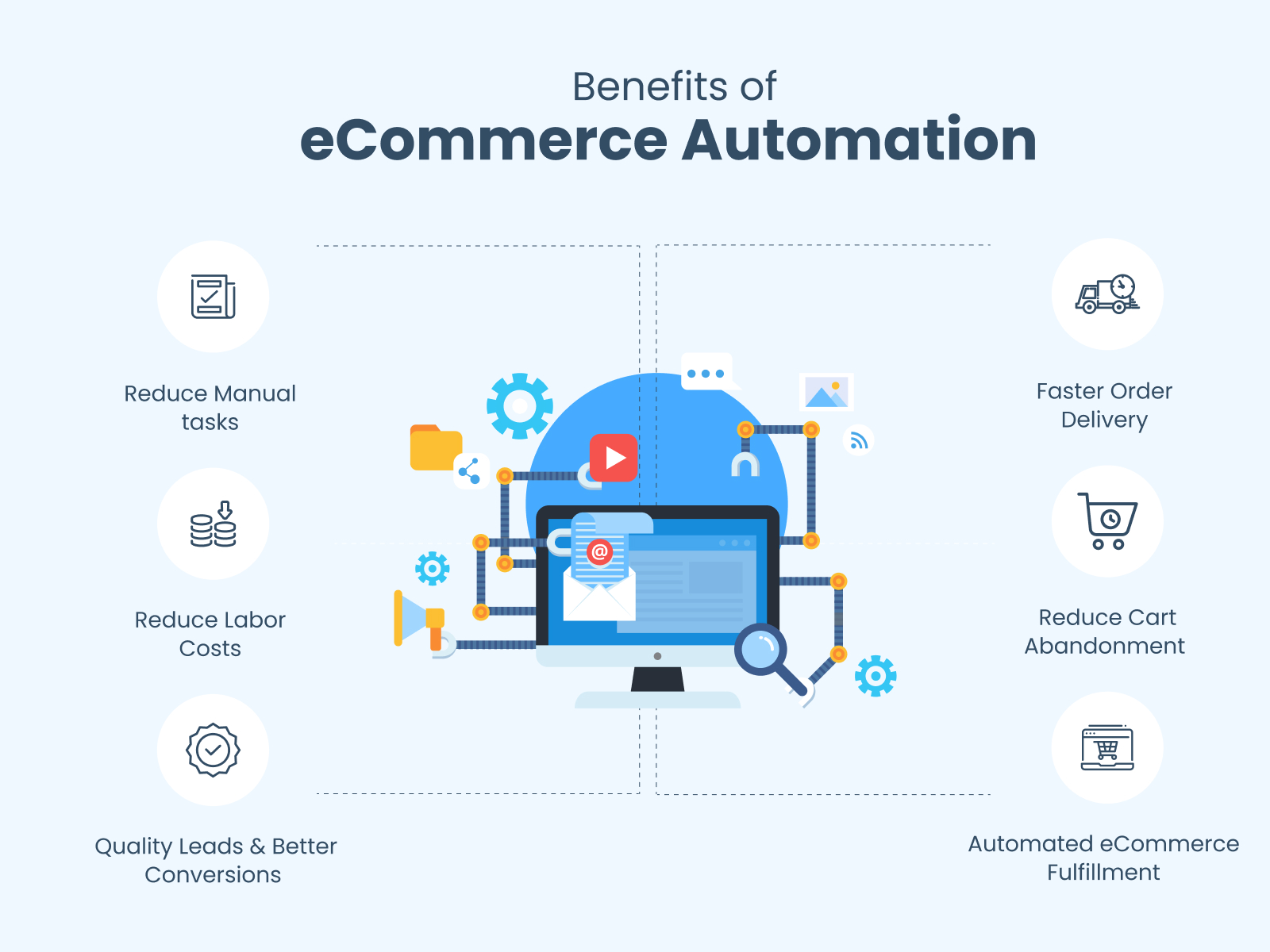
Choosing the right type of Ecommerce automation can be a game-changer for your business.
It streamlines processes, saves time, and enhances customer experiences. When you automate the right tasks, you can focus on what matters most: growing your business.
Let's dive into the benefits of picking the right Ecommerce automation tools.
Enhanced Efficiency
Ecommerce automation software can significantly boost your efficiency. Automating repetitive tasks like inventory management, order processing, and shipping frees up valuable time.
You can use this time to focus on strategic tasks that drive growth. For instance, Ecommerce fulfillment automation ensures that orders are processed and shipped quickly, reducing errors and delays.
Improved Customer Experience
Automating customer service tasks can lead to happier customers.
Ecommerce chatbot solutions provide instant responses to common queries, enhancing customer satisfaction.
Similarly, Ecommerce email marketing automation allows you to send personalized emails at the right time, keeping customers engaged and informed.
Increased Sales

Ecommerce automation tools help you target the right customers with the right message.
Ecommerce marketing automation for Ecommerce allows you to segment your audience and tailor your marketing efforts.
This personalized approach can lead to higher conversion rates and increased sales. Automated follow-ups and abandoned cart reminders ensure that potential sales are not lost.
Cost Savings
By reducing manual tasks, Ecommerce automation can lead to significant cost savings.
Fewer errors mean less money spent on correcting mistakes. Marketing automation for Ecommerce can also help you manage your resources more effectively, ensuring that you are not overstaffed or overstocked.
Scalability
As your business grows, managing everything manually becomes impossible.
Ecommerce automation provides the scalability you need to grow without compromising on efficiency.
Whether it’s handling more orders or managing a larger inventory, Ecommerce automation makes scaling up seamless and hassle-free.
Choosing the right type of Ecommerce automation is crucial. It’s not just about automating tasks but about doing it smartly to enhance your overall business operations.
Types of Ecommerce Automation
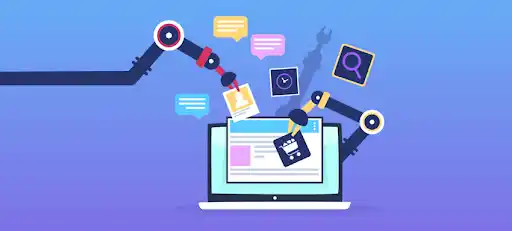
Exploring the different types of Ecommerce automation can help you streamline operations, improve customer satisfaction, and boost sales.
Let's delve into three essential types: Ecommerce marketing automation, customer service automation, and marketing automation.
Each type brings unique features and benefits, making your Ecommerce business more efficient and effective.
Order Management Automation

Order management automation handles everything from order processing to shipping, ensuring smooth operations.
This type of Ecommerce automation reduces manual work and errors, making your fulfillment process faster and more reliable.
Key Features
Given below are the key features of Ecommerce automation:
Inventory Tracking: Automatically updates inventory levels as orders are placed. For instance, if a product is purchased, the system updates the stock count in real time, preventing overselling.
Order Processing: Streamlines the steps from order receipt to dispatch. This means when a customer places an order, the system processes payment, generates an invoice, and sends the order to the warehouse for packing.
Shipping Management: Integrates with carriers to automate shipping label creation and tracking. Imagine a system that selects the best shipping option, prints the label, and sends tracking information to the customer automatically.
Benefits
Here are the benefits of order management automation:
Reducing Errors: By automating order entry and processing, mistakes are minimized. For example, eliminating manual data entry ensures that addresses are accurate, reducing the risk of shipping errors.
Speeding Up Fulfillment: Ecommerce automation speeds up the order processing cycle. Orders are quickly verified, packed, and shipped, leading to faster delivery times and happier customers.
Enhancing Customer Experience: Real-time updates and accurate order tracking improve customer satisfaction. Customers appreciate knowing exactly when their orders will arrive.
Ideal Tool
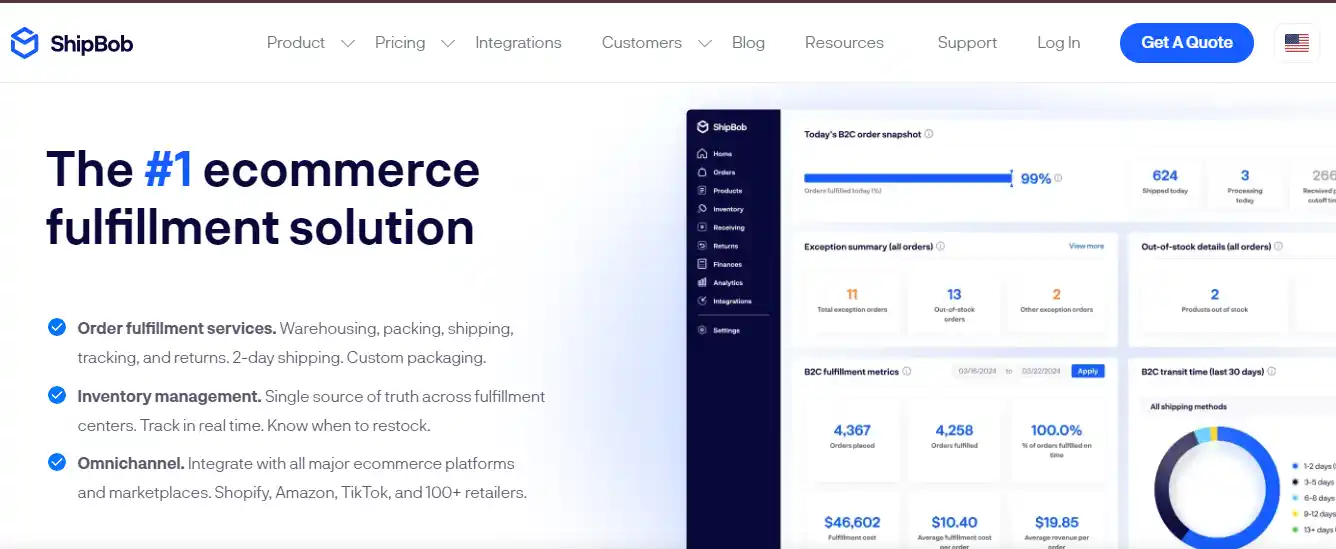
ShipBob is an Ecommerce automation tool that integrates seamlessly with your store, handling everything from order management to shipping.
It optimizes the entire fulfillment process, ensuring timely deliveries and satisfied customers.
Customer Service Automation
Customer service automation uses technology to handle customer inquiries and support tasks.
It ensures customers receive quick and accurate responses, improving their overall experience.
Key Features
Given below are the key features:
Chatbots: Automated chat systems that can answer common queries. For instance, an Ecommerce chatbot like BotPenguin can provide instant answers about product availability, return policies, or order status, enhancing customer engagement.
Automated Email Responses: Sends immediate replies to customer emails. Imagine a customer emailing about a return; the system can instantly acknowledge receipt and provide the next steps.
Customer Feedback Systems: Automatically collects and analyzes feedback. After a purchase, customers receive a survey request, and the system aggregates responses to identify trends and areas for improvement.
Benefits
Here are the benefits of customer service automation:
24/7 Customer Support: Ecommerce automation ensures support is available round-the-clock. Even outside business hours, an Ecommerce chatbot can handle inquiries, ensuring customers always receive assistance.
Personalization: Automated systems can personalize interactions. For example, using previous purchase data, an email response system can recommend products tailored to the customer's interests.
Efficient Handling of Queries: Quick, accurate responses reduce the workload on human agents. Complex issues are escalated to staff, while routine questions are handled automatically, improving efficiency.
Ideal Tool
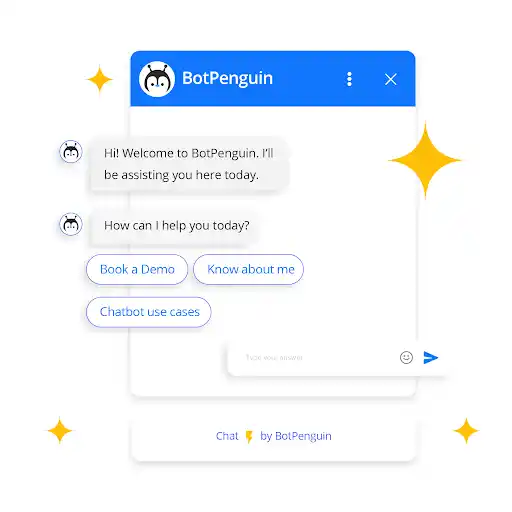
BotPenguin is a no-code AI chatbot platform that allows you to create chatbots for multiple platforms, from websites to social media.
It handles tasks like answering product queries, sending order notifications, and tracking orders, all without needing coding knowledge.
Marketing Automation
Marketing automation for Ecommerce focuses on automating repetitive marketing tasks, enabling you to deliver personalized experiences to customers. This boosts engagement and drives sales.
Key Features
Given below are the key features:
Email Marketing: Automates the sending of targeted email campaigns. For example, Ecommerce email marketing automation tools can send welcome emails to new subscribers or follow-up emails based on purchase history.
Social Media Automation: Schedules and posts content on social media platforms. Imagine having a tool that posts updates on Facebook, Instagram, and Twitter at optimal times without manual intervention.
Personalized Recommendations: Uses customer data to suggest products. When a customer browses your site, the system recommends products based on their behavior and past purchases, increasing the likelihood of a sale.
Suggested Reading:
E-commerce Marketing Metrics that Matter
Benefits
Here are the benefits of marketing automation:
Increased Engagement: Automated marketing ensures consistent communication with customers. Regular updates and personalized offers keep customers interested and engaged with your brand.
Time and Resource Savings: Automation frees up your marketing team to focus on strategy rather than repetitive tasks. Scheduling posts and sending automated emails reduce the need for manual work.
Better Targeting: Data-driven automation allows for precise targeting. By analyzing customer behavior, you can send highly relevant messages that resonate with each segment of your audience.
Ideal Tool
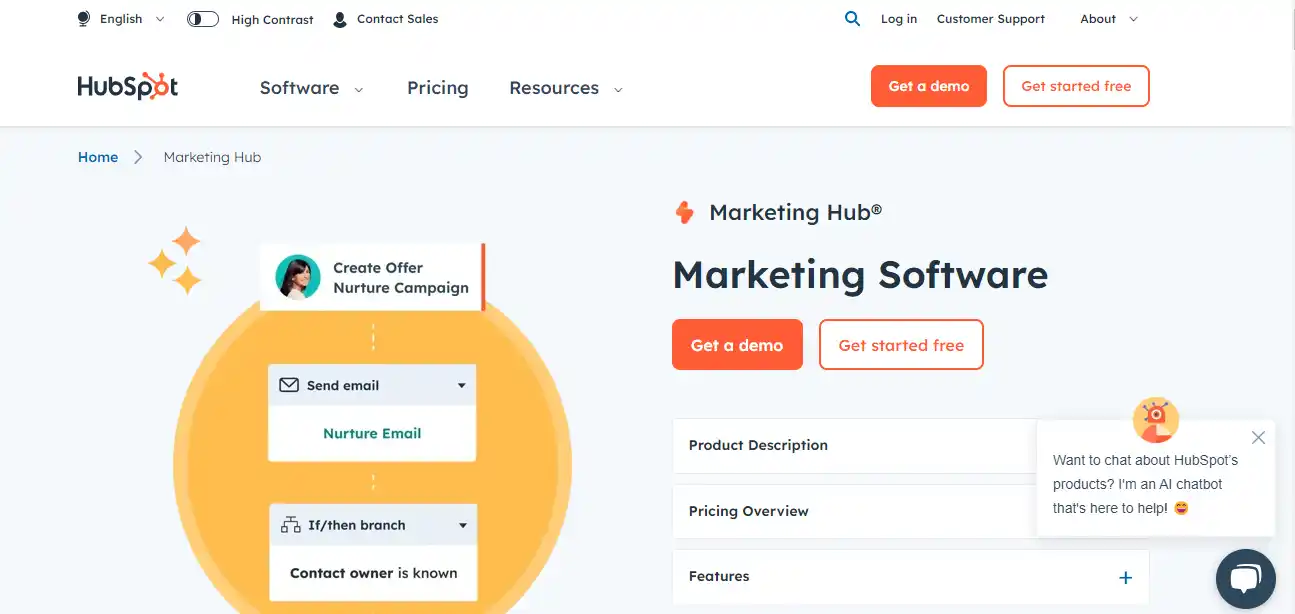
HubSpot is a comprehensive marketing automation platform that covers everything from email campaigns to social media scheduling.
It integrates well with Ecommerce platforms, providing tools for creating personalized marketing experiences.
Sales and Conversion Automation
Sales and conversion automation focuses on optimizing the sales funnel to increase conversion rates and maximize revenue.
This type of Ecommerce automation ensures that potential customers are effectively guided through the buying process, leading to more sales.
Key Features
Given below are the key features:
Lead Scoring: Automatically ranks leads based on their likelihood to convert. For example, the system analyzes customer behavior, such as website visits and email interactions, to assign scores and prioritize high-potential leads.
Automated Follow-ups: Sends timely follow-up emails to potential customers. If a visitor abandons their cart, an automated email is sent to remind them to complete the purchase, often with a special offer to incentivize the action.
Abandoned Cart Recovery: Recovers lost sales by sending reminders to customers who didn’t complete their purchases. This can include emails, SMS, or even retargeting ads that display the items they left behind.
Suggested Reading:
Sealing the Deal: How eCommerce Chatbot Boosts Conversions
Benefits
Here are the benefits of sales and conversion automation:
Higher Conversion Rates: Automated follow-ups and abandoned cart recovery boost conversion rates by re-engaging potential customers. For example, sending a reminder email with a discount code can persuade a customer to finalize their purchase.
Improved Sales Processes: Streamlining the sales process with automation ensures no lead is overlooked. This results in more efficient management of potential customers and increased sales opportunities.
Enhanced Customer Relationships: Personalized automated interactions make customers feel valued and understood, fostering loyalty and repeat business.
Ideal Tool
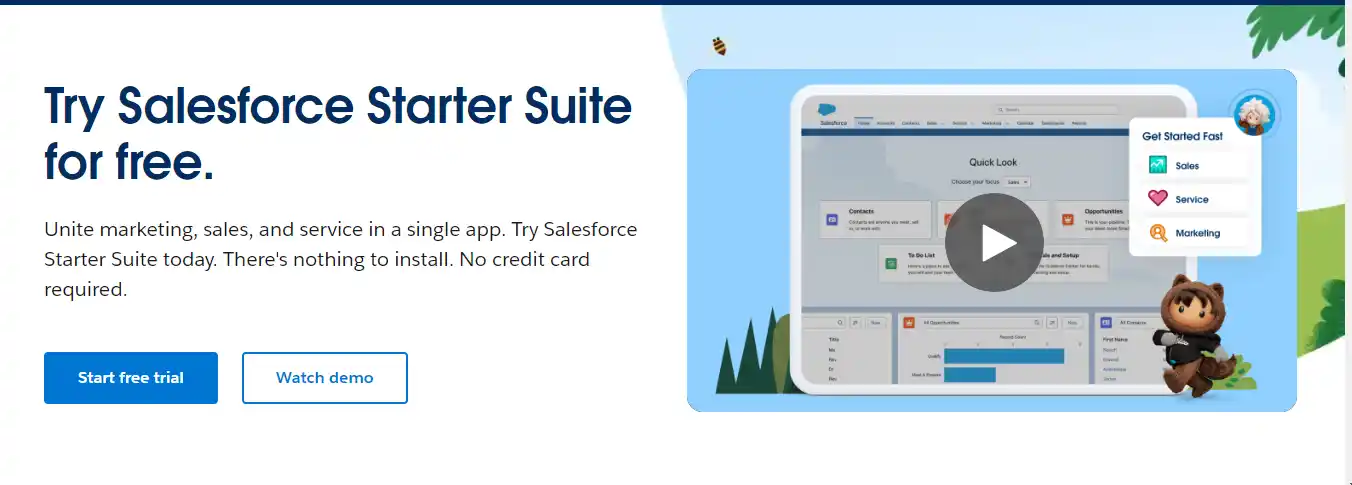
Salesforce is an Ecommerce automation software that integrates lead scoring, follow-ups, and abandoned cart recovery into one platform. It helps businesses manage and convert leads effectively.
Inventory Management Automation
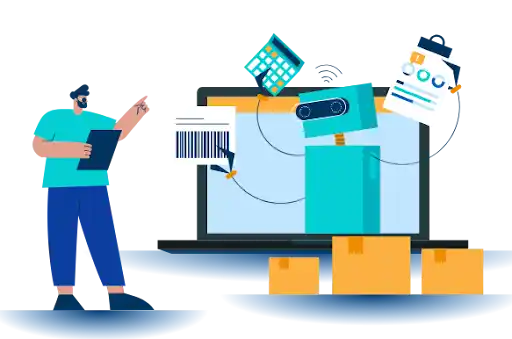
Inventory management automation helps maintain optimal stock levels, preventing stockouts and overstocks.
This type of Ecommerce automation ensures your inventory is accurately tracked and replenished as needed.
Key Features
Given below are the key features:
Real-time Stock Updates: Automatically update inventory levels as sales occur. For instance, when a product is sold, the inventory count is immediately adjusted, ensuring accurate stock levels.
Automated Reordering: Reorders products when stock levels fall below a certain threshold. This prevents stockouts by ensuring that popular items are always available.
Demand Forecasting: Uses historical sales data to predict future demand. This helps businesses plan inventory purchases based on anticipated sales trends, reducing the risk of overstocking.
Benefits
Given below are the amazing benefits:
Avoiding Stockouts and Overstocks: Automated reordering and real-time updates help maintain optimal stock levels, ensuring products are available when customers need them. For example, a surge in sales of a particular item triggers an automatic reorder, preventing stockouts.
Streamlining Operations: Automation reduces manual inventory checks and updates, saving time and reducing errors. This allows staff to focus on more strategic tasks.
Cost Savings: Accurate inventory management minimizes excess stock and associated storage costs. It also reduces losses from unsold inventory.
Ideal Tool
TradeGecko is an inventory management automation tool that offers real-time updates, automated reordering, and demand forecasting.
It integrates with Ecommerce platforms to streamline inventory management.
Financial Management Automation

Financial management automation simplifies accounting processes, ensuring accuracy and efficiency.
This type of Ecommerce automation handles invoicing, expense tracking, and financial reporting.
Key Features
Given below are the key features:
Automated Invoicing: Generates and sends invoices automatically. For instance, when a sale is made, the system creates an invoice and sends it to the customer, ensuring timely billing.
Expense Tracking: Monitors and categorizes expenses automatically. This helps businesses keep track of where money is being spent and identify areas for cost savings.
Financial Reporting: Creates detailed financial reports automatically. Businesses can generate profit and loss statements, balance sheets, and cash flow reports with just a few clicks.
Benefits
Given below are the advantages of financial automation:
Accuracy and Compliance: Automated financial management reduces the risk of errors in invoicing and reporting, ensuring compliance with financial regulations. For example, automated systems can calculate taxes accurately, reducing the risk of mistakes.
Time Efficiency: Automation saves time by handling repetitive accounting tasks, allowing staff to focus on more strategic financial planning.
Better Financial Insights: Detailed reports provide valuable insights into business performance, helping to make informed financial decisions. Automated reports can highlight trends and areas for improvement.
Ideal Tool

QuickBooks is a financial management automation tool offers automated invoicing, expense tracking, and detailed financial reporting.
It integrates with Ecommerce platforms to streamline financial operations.
Analytics and Reporting Automation
Analytics and reporting automation focuses on collecting, analyzing, and presenting data to help you make informed business decisions.
This type of Ecommerce automation provides insights into various aspects of your business, from sales trends to customer behavior.
Key Features
Here are the features of analytics and automation tool:
Performance Dashboards: Centralizes all your key metrics in one place. For example, a dashboard can display real-time sales data, website traffic, and customer engagement, allowing you to monitor performance at a glance.
Custom Reports: Generates reports tailored to your specific needs. Imagine creating a report that tracks the effectiveness of your Ecommerce email marketing automation campaigns, providing insights into open rates, click-through rates, and conversions.
Predictive Analytics: Uses historical data to forecast future trends. This feature can help you anticipate sales spikes and adjust inventory levels accordingly, ensuring you’re prepared for high-demand periods.
Benefits
Given below are the benefits:
Data-Driven Decisions: Access to detailed analytics enables you to make informed decisions. For instance, identifying which products are selling well and which are not can guide your inventory and marketing strategies.
Identifying Trends: Automated reports highlight trends and patterns in your data. You might discover that certain times of the year see higher sales for specific products, allowing you to plan targeted promotions.
Optimizing Business Strategies: Insights from analytics help refine your business strategies. For example, understanding customer behavior can lead to more effective marketing automation for Ecommerce efforts, enhancing customer engagement and boosting sales.
Ideal Tool
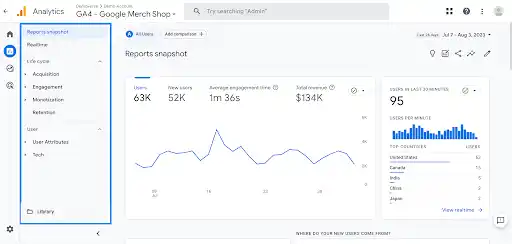
Google Analytics offers comprehensive analytics and reporting features.
It integrates with Ecommerce platforms to provide insights into website performance, customer behavior, and sales trends, helping you make data-driven decisions.
Supply Chain Automation
Supply chain automation focuses on streamlining the various processes involved in getting products from suppliers to customers.
This type of Ecommerce automation ensures that your supply chain operates smoothly and efficiently.
Key Features
Here are the key features of supply chain automation:
Supplier Management: Automates communication and transactions with suppliers. For instance, the system can automatically place orders with suppliers when inventory levels fall below a certain threshold, ensuring timely restocking.
Logistics Tracking: Provides real-time tracking of shipments. Imagine knowing exactly where your products are at any given time, from the moment they leave the supplier to when they arrive at your warehouse.
Automated Procurement: Streamlines the purchasing process. The system can evaluate supplier performance, compare prices, and make procurement decisions based on predefined criteria, reducing manual intervention and errors.
Benefits
Given below are the benefits:
Enhanced Coordination: Ecommerce automation improves coordination between different parts of the supply chain. For example, real-time updates on shipment status allow your warehouse team to prepare for incoming stock, speeding up the receiving process.
Reduced Delays: Automated systems help prevent delays by ensuring timely orders and accurate tracking. If a shipment is delayed, the system can alert you immediately, allowing you to take corrective action.
Cost Efficiency: Optimized supply chain processes reduce costs. By automating procurement, you can find the best deals and avoid overordering, which reduces storage costs and waste.
Ideal Tool
SAP Integrated Business Planning (IBP) offers advanced supply chain automation features, including supplier management, logistics tracking, and automated procurement.
It integrates well with Ecommerce platforms to streamline your supply chain operations.
Conclusion
Ecommerce automation offers a wealth of opportunities for online retailers to streamline operations, enhance customer experiences, and drive growth.
Ecommerce automation software continues to evolve, integrating advanced features like AI and machine learning to provide more personalized and efficient solutions.
Whether it's through Ecommerce email marketing automation that delivers targeted campaigns or Ecommerce chatbots that offer 24/7 customer support, these tools are essential for staying competitive in today's fast-paced online retail environment.
Platforms like BotPenguin are at the forefront of this revolution, offering customizable Ecommerce chatbot solutions that can significantly enhance customer service and engagement.
By leveraging such tools, businesses can automate routine tasks, freeing up valuable time and resources to focus on strategic growth initiatives.
As we look to the future, the importance of marketing automation for Ecommerce and Ecommerce fulfillment automation will only continue to grow.
Businesses that embrace these technologies and continuously adapt their strategies will be best positioned to thrive.
Whether you're implementing Ecommerce email marketing automation or exploring advanced Ecommerce automation software, the ultimate aim should be to create seamless, efficient, and personalized shopping experiences that drive customer satisfaction and loyalty.
Suggested Reading:
The Impact of AI and Chatbots in E-commerce Marketing
Frequently Asked Questions (FAQs)
What is Ecommerce automation?
Ecommerce automation uses technology to automate repetitive tasks and processes within an Ecommerce business.
This includes order processing, inventory management, customer service, marketing, and financial tasks, resulting in increased efficiency and reduced manual errors.
What are the benefits of customer service automation?
Customer service automation provides 24/7 support, reduces response times, and improves customer satisfaction.
Tools like chatbots handle common queries instantly, allowing human agents to focus on more complex issues.
How can marketing automation for Ecommerce boost sales?
Marketing automation for Ecommerce personalized marketing efforts, sending targeted messages based on customer behavior.
It includes email campaigns, social media posts, and recommendations, increasing engagement and conversion rates.
What is the role of chatbots in Ecommerce automation?
Chatbots for Ecommerce automate customer interactions, providing instant responses to queries, assisting with orders, and offering personalized recommendations.
Platforms like BotPenguin enable easy chatbot integration without coding.
Why is choosing the right Ecommerce automation software important?
Choosing the right Ecommerce automation software ensures seamless integration, scalability, and functionality tailored to your business needs.
It maximizes efficiency, reduces costs, and enhances the customer experience, driving overall growth.


